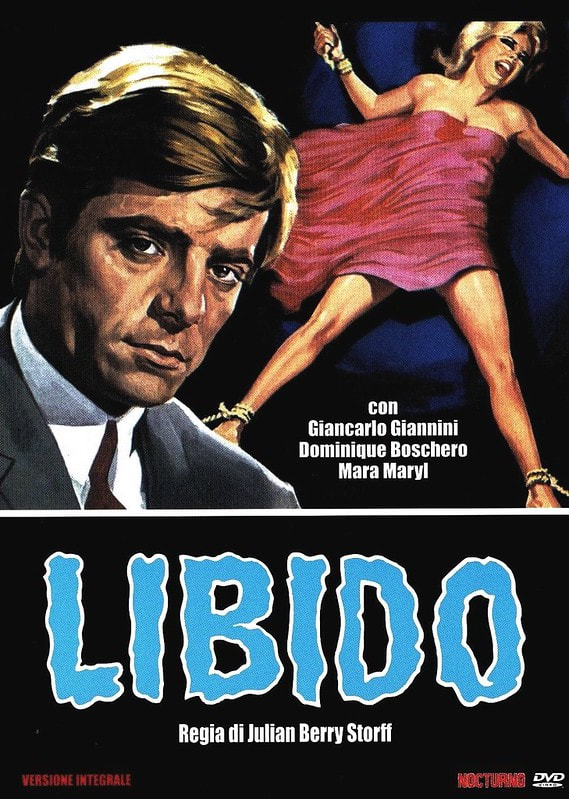Young child Christian, heir to a vast fortune, witnesses his sex-crazed father abuse various women by tying them up in a glass-walled room in his seaside mansion. (OK, that part of the plot is fairly specific to this film...) One day, Christian walks in on his mother as she dies from injuries inflicted by his father, who, apparently riddled with guilt, jumps into the sea. Fast forward to the present 1964 day and Christian is months away from inheriting his family's estate, which will be passed to him on his 25th birthday by the executor of his father's will, as long as he is demonstrably of sound mind. Christian, displaying evidence of a possibly-unsound mind, makes the questionable decision to visit his childhood home, featuring the potentially-triggering room of glass, ahead of his birthday. He's accompanied by his new wife, Helene, the estate's executor Paul (formerly Helene's boss), and Paul's ditzy wife Brigitte. Tensions simmer between Paul and Christian, who begins having visions of his father (whose body was never recovered) skulking around the house at night. Is Christian's mind becoming increasingly unsound? Or, is the mysterious person whom we see walking slooooooowly through the halls at night (paying a visit to Helene, who greets them familiarly, on the first night) trying to trick him out of his inheritance? Well, both, obviously!
As the ladies' names suggest, this film is set in France, possibly as a nod to what was obviously its main progenitor (Les Diaboliques), and possibly also to add a layer of mystery and 'otherness' which comes with foreign settings. The film is essentially a four character chamber piece, but things never really drag. It's not a mind-blowingly brilliant work, but it's very enjoyable, and, as noted, the importance of its place in giallo history cannot be understated.
Take the opening sequence, in which a formally-dressed boy (wearing shorts) witnesses a traumatic event to the tune of a nursery rhyme/lullaby, and compare it to the opening of Deep Red. Though the film probably had more of an influence over the 60s gialli of Lenzi and Guerreri than Argento's later work, the formal precision of much of the camerawork does again call to mind Dario's masterpieces (with the caveat that Mario Bava was pretty nifty at the ol' cinematography too). Whereas Blood and Black Lace spawned (belatedly) the string of body count slashers, Libido represents a very, very early example of the 'rich people squabble over inheritance' subgenre. It actually straddles the 'killer's motivation' divide, with greed and previously-repressed madness/trauma both getting an airing. We also have an early use of the 'is the dead person whose body was never found really dead?' cliché, which, while never really presenting itself as a realistic prospect here, does at least open up the film somewhat with a phantom fifth character.
It's difficult to assess the film in some ways, due to the aforementioned 'early use of clichés'. Taken in isolation, it's a nifty little thriller which looks great and contains many twists and turns towards the end. Watching the film as a twenty first century viewer, the twists satisfy rather than shock, as we know pretty much exactly what's going to happen once the set up is made clear. That's not because of predictable storytelling, rather the sheer volume of similarly twisty thrillers which followed this film (and, to be fair, predated it). In some ways, the only truly shocking twist would be if there was no twist, though that would naturally make for a far worse film, and, of course, the filmmakers weren't making Libido with jaded future cineastes in mind.
They were making it with passion and skill, though, eking everything they could from meagre resources (supposedly Enrico Maria Salerno, brother of co-director Vittorio, lost out to Luciano Pigozzi for the role of Paul because the prosthetics he wanted to wear were too costly for the budget). As well as Les Diaboliques, the Italian Gothic films were a clear influence - there's much nighttime creeping around isolated hallways as the wind howls outside. The film could be classed as 'contemporary Gothic', with its formal style allied to the theme of inherited madness. This was something which subsequent gialli largely forewent - they took the mansion, small cast and seaside setting, but the Gothic element presumably died out along with that genre, sometime in the mid 60s.
There's an element of Freudian psycho-sexuality throughout, right from the opening moments with a speedy title crawl explaining Sigmund's concept of the libido. The focus on childhood trauma, which is engaged in a constant struggle with the more Gothic concept of inherited madness, is classicly Freudian, with a son watching his mother suffer a sexually-misadventurous death. These themes aren't necessarily deeply interrogated or developed by the film; they act more as a framework onto which the plot can be hung, but then again, we don't watch gialli to see formal character studies, do we? (I don't, anyway.)
Overall, this is a (and I'll use the phrase again) nifty little thriller which will please rather than delight. Better giallo films followed in its wake, but many of them, particularly those which were made in its immediate aftermath, owed this film a large debt. Watching it now, there's the sense of watching a cornerstone of the filone's history falling neatly, and satisfyingly into place (and, as comes with the territory when there's a seaside setting, falling into plaice).

 RSS Feed
RSS Feed
